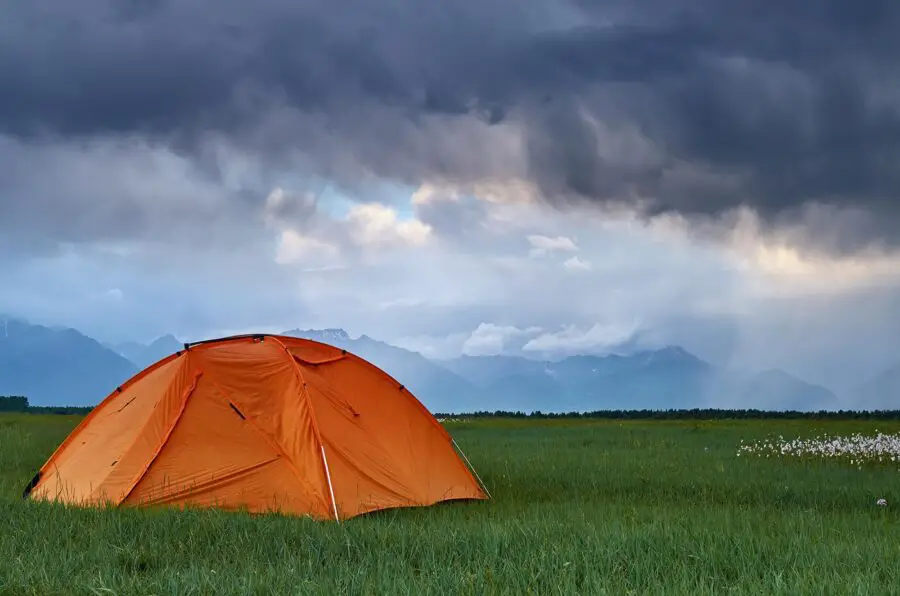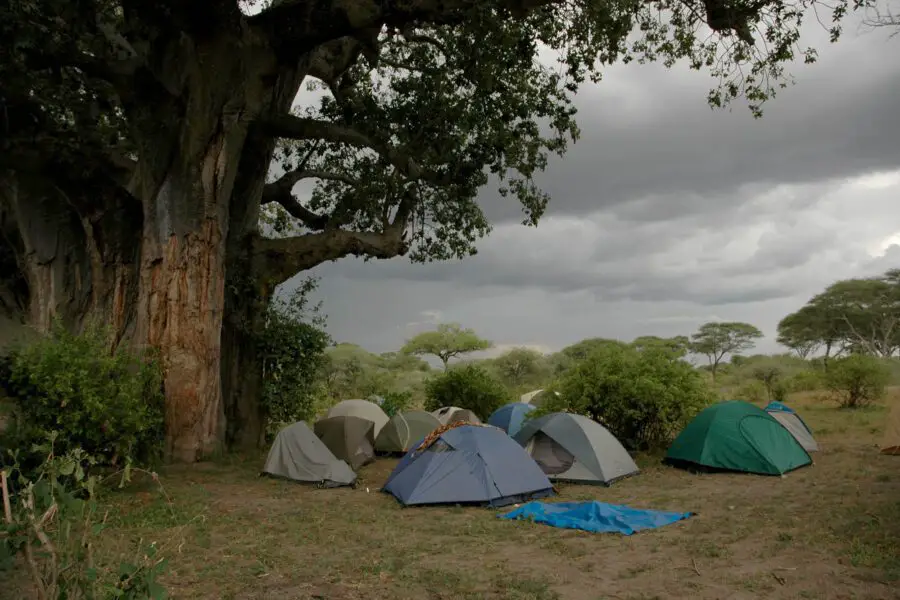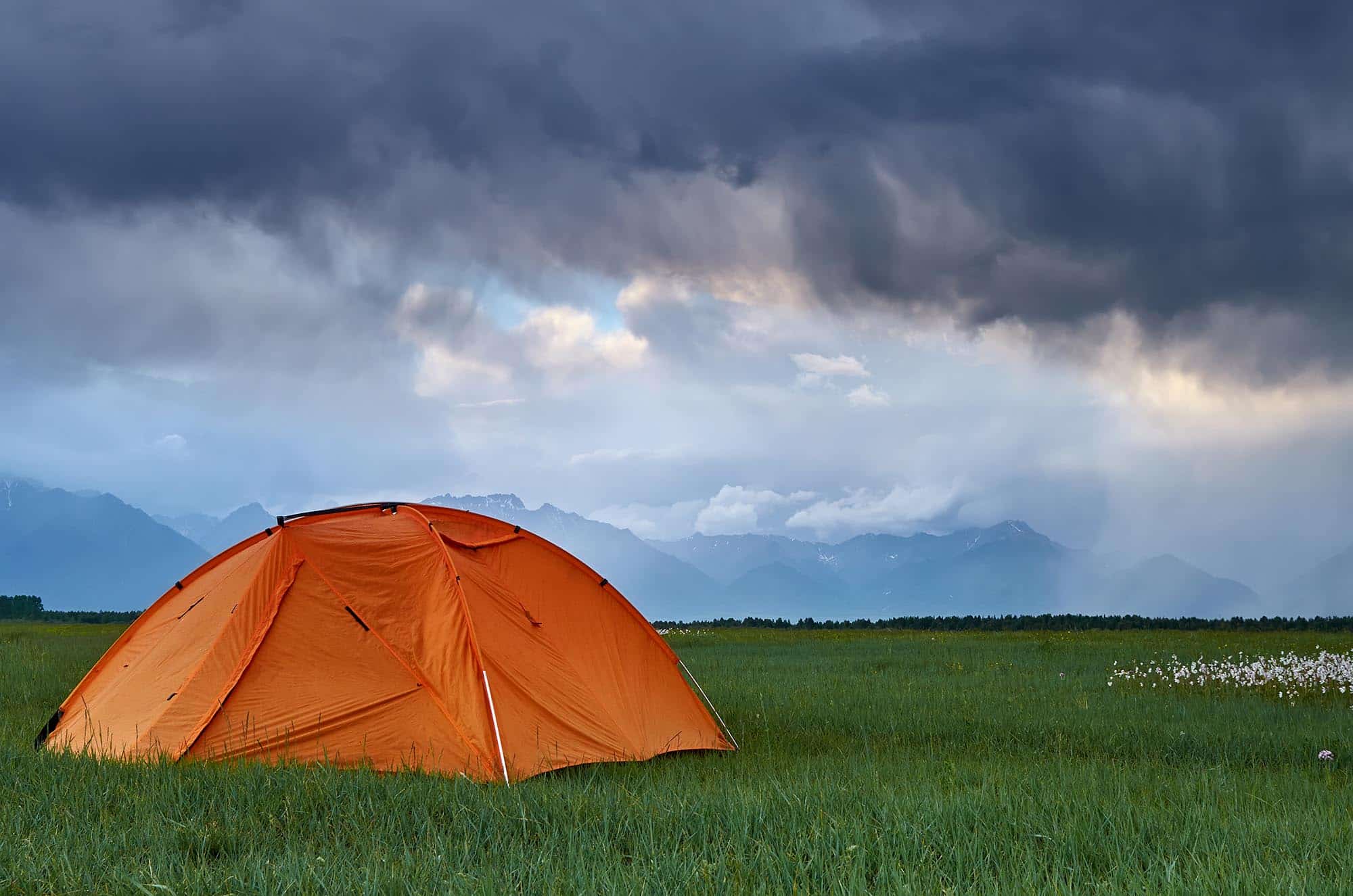It’s close to impossible to go camping and not experience some bad weather at some point, no matter how much you plan. Dealing with severe weather and lightning when camping, particularly if it catches you off-guard, is all about understanding the risk of what you’re dealing with. Getting stuck in a thunderstorm can be terrifying, but you will be fine if you’re prepared for it.
Is It Safe To Camp During A Thunderstorm?
There is no correct answer to this question. However, if there are storms or severe weather in the forecast for your camping trip, it is best to postpone. Weather can be unpredictable, and you might find yourself caught in something you weren’t expecting. The chances of getting struck by lightning are low. However, the chances of getting struck by lightning when camping in an open field are higher.
Understanding The Risks
Lightning when camping isn’t the only risk to deal with if you get caught outdoors. Others include:
- Trees falling: Whether it’s the wind or the rain that causes the trees to sway, a tree falling could be deadly.
- Flash Flooding: Several feet of water can pour down valleys or riverbeds in the blink of an eye under heavy rain. An average of 88 people drown in flash floods yearly.
- Tent blowing away: Most storms will bring heavy winds, and if your tent is not secure enough it could blow away.
- Getting soaked by rain: While this may not seem like a huge deal or risk, getting soaked along with all your clothes and gear can become an issue, the main issue being hypothermia.

How To Stay Safe During a Thunderstorm
If there is no cover around to protect yourself if you experience lightning when camping, consider putting yourself in what’s known as the “lightning position.” Follow these steps, and stay in this position until the storm passes:
- Groups should seperate, staying at least 164 feet (50 meters) apart from each other
- Find an insulated pad or cloth pad to stand on, avoiding areas where metal is nearby
- Bring your feet closely together
- Crouch down and wrap your arms around your knees
- Stay in this position, and do not sit down
Staying Safe in Varied Terrains
Different terrains require different strategies to stay safe from lightning when camping.
- Mountains: Higher peaks that are above the treeline are at more risk to attract a return current or lightning strike. If you hear a storm coming, turn around to head back toward shelter under the treeline.
- Rolling hills: Lightning striking on smoother topography can be random, so it can be risky staying there. Find shelter if you hear a storm coming or get into the lightning position if you’re already caught in it.
- Open fields: If there is no shelter, make sure you’re far from anything that can be struck and conduct current, such as metal or water. Stay clear of tall trees that stand alone, then get into the lightning position.
- Forests: Forests are less risky with trees being all bunched together. Don’t get too close to large tree trunks, but stay covered.
- Water: Open water is one of the riskiest places when lightning strikes. Avoid water activities if the forecast is predicting any sort of storm at all.
We also have a blog on more general lightning safety tips, which is also worth a read.

How To Prepare For Lightning When Camping
While the forecast may call for great weather, a storm can sometimes brew unexpectedly, leaving you to scramble. It’s always best to be prepared to avoid a catastrophe. Here are some tips to get and stay prepared for lightning when camping:
- Choose the right tent: Most tents today are made of plastic with carbon fiber poles, which are less conductive than metal. Carbon fiber is still a conductor, but it’s a much better option than older tents made from metal or aluminum. You should also avoid bell tents, which have a pole right in the center. A carbon fiber tent reduces your risk.
- Find a lightning-safe camp location: Location is important when choosing a camping spot because some locations are higher risk than others. Avoid setting up camp below the treeline; your tent should never be the highest object. Avoid putting the tent right under tall objects, such as trees. Don’t set up near the entrance of a cave, unless you are deep in the cave, you’re still at risk. Pitch your text in a low-lying area, but away from washes, streams, creeks, and rivers.
- Prepping as the storm brews: Check on all your gear, and ensure tent stakes and guylines are secure. Relocate to lower ground if necessary, or move your tent away from tall trees. Get your rain gear ready. Do this quickly because the storm could be closer than you think!
- Finding shelter: In some cases, shelter may not be nearby. However, try setting up camp near a shelter that you can get to quickly. Some shelter options include your car or a building. Some types of shelter to avoid are: picnic/patio covers and outhouses.
- Ground strike safety: You may think you’re only at risk of getting struck directly by lightning when camping, but most instances are actually ground strikes. This is when lightning strikes and the ground conducts electricity, possibly making it to you. Position yourself on an insulated pad or sleeping bag.
- Spread out: If you’re camping with a group, tents that are grouped together are more attractive to a lightning strike. While you should be out of your tent if you have other shelter, it’s better to spread the tents apart in the case it’s your own form of shelter from the threat of hypothermia. It’s also less likely for lightning to jump from one person to another if you’re all spread out.
- Steer clear of water: Don’t think that just because the ground is wet that the lightning won’t be able to strike, standing in water is not any safer than being on dry land: in fact, it might make it easier for the ground to conduct electricity.
Lightning when camping can be scary. But with a few simple steps, you can ensure that you and your campmates reduce your risk of getting struck. We also recommend picking up a lightning detector to give you advance warning of incoming storms.


